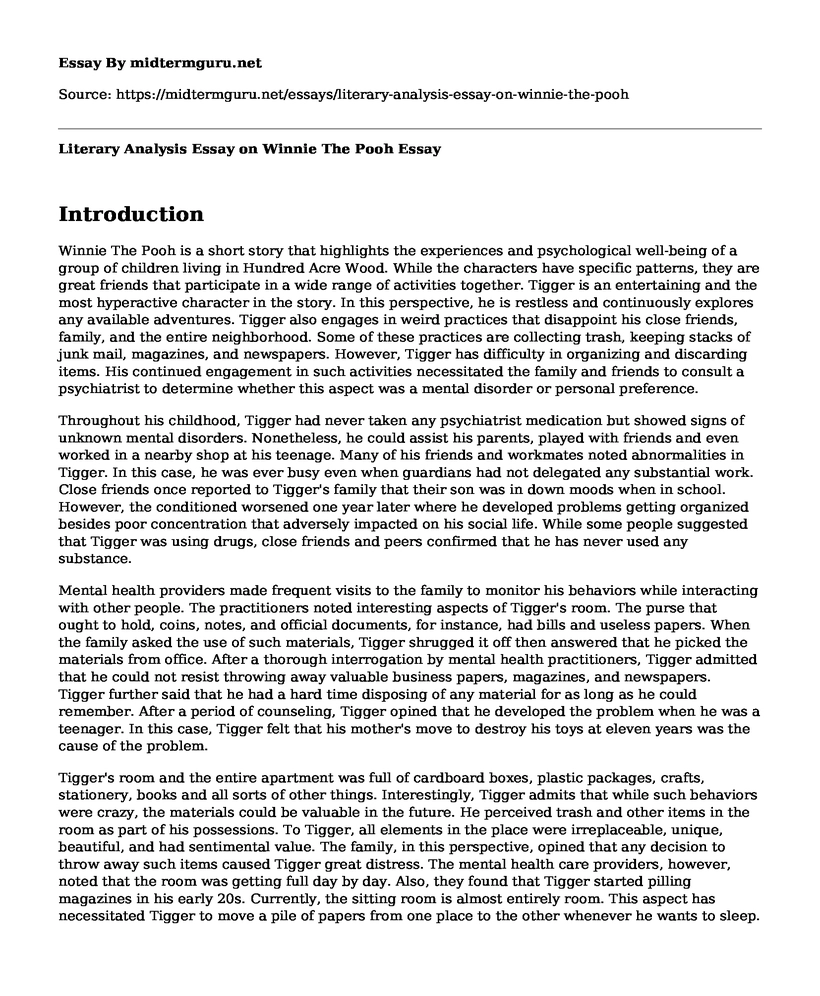Introduction
Winnie The Pooh is a short story that highlights the experiences and psychological well-being of a group of children living in Hundred Acre Wood. While the characters have specific patterns, they are great friends that participate in a wide range of activities together. Tigger is an entertaining and the most hyperactive character in the story. In this perspective, he is restless and continuously explores any available adventures. Tigger also engages in weird practices that disappoint his close friends, family, and the entire neighborhood. Some of these practices are collecting trash, keeping stacks of junk mail, magazines, and newspapers. However, Tigger has difficulty in organizing and discarding items. His continued engagement in such activities necessitated the family and friends to consult a psychiatrist to determine whether this aspect was a mental disorder or personal preference.
Throughout his childhood, Tigger had never taken any psychiatrist medication but showed signs of unknown mental disorders. Nonetheless, he could assist his parents, played with friends and even worked in a nearby shop at his teenage. Many of his friends and workmates noted abnormalities in Tigger. In this case, he was ever busy even when guardians had not delegated any substantial work. Close friends once reported to Tigger's family that their son was in down moods when in school. However, the conditioned worsened one year later where he developed problems getting organized besides poor concentration that adversely impacted on his social life. While some people suggested that Tigger was using drugs, close friends and peers confirmed that he has never used any substance.
Mental health providers made frequent visits to the family to monitor his behaviors while interacting with other people. The practitioners noted interesting aspects of Tigger's room. The purse that ought to hold, coins, notes, and official documents, for instance, had bills and useless papers. When the family asked the use of such materials, Tigger shrugged it off then answered that he picked the materials from office. After a thorough interrogation by mental health practitioners, Tigger admitted that he could not resist throwing away valuable business papers, magazines, and newspapers. Tigger further said that he had a hard time disposing of any material for as long as he could remember. After a period of counseling, Tigger opined that he developed the problem when he was a teenager. In this case, Tigger felt that his mother's move to destroy his toys at eleven years was the cause of the problem.
Tigger's room and the entire apartment was full of cardboard boxes, plastic packages, crafts, stationery, books and all sorts of other things. Interestingly, Tigger admits that while such behaviors were crazy, the materials could be valuable in the future. He perceived trash and other items in the room as part of his possessions. To Tigger, all elements in the place were irreplaceable, unique, beautiful, and had sentimental value. The family, in this perspective, opined that any decision to throw away such items caused Tigger great distress. The mental health care providers, however, noted that the room was getting full day by day. Also, they found that Tigger started pilling magazines in his early 20s. Currently, the sitting room is almost entirely room. This aspect has necessitated Tigger to move a pile of papers from one place to the other whenever he wants to sleep.
Ashamed of the state of the room, Tigger cannot invite anybody to his place besides avoiding social interactions with the neighborhood. Also, he avoids dating since he is aware that he cannot take anyone to his room. Mental health professionals later diagnosed Tigger with a mental disorder. This mental illness made him develop a difficulty getting rid of some items provided that he can recall. Hence, the behavior of excessive acquisition of additional materials and unwillingness to discard them made is because of a mental disorder.
Cite this page
Literary Analysis Essay on Winnie The Pooh. (2023, Jan 12). Retrieved from https://midtermguru.com/essays/literary-analysis-essay-on-winnie-the-pooh
If you are the original author of this essay and no longer wish to have it published on the midtermguru.com website, please click below to request its removal:
- Poetry Analysis Essay on The Fish by Elizabeth
- Paper Example on Gender Differences in Statistical Anxiety Among South Australian Undergraduate Students
- Soul by Soul Book Essay Example
- Literary Analysis Essay on Modern Values Evident in Beowulf Character
- Winston Smith, Hero or Not? - Essay Sample
- Philosophy, Morals & Future: Exploring Relationships & Beliefs - Essay Sample
- Personality Traits: From Hippocrates to Behavioral Genetics - Essay Sample







